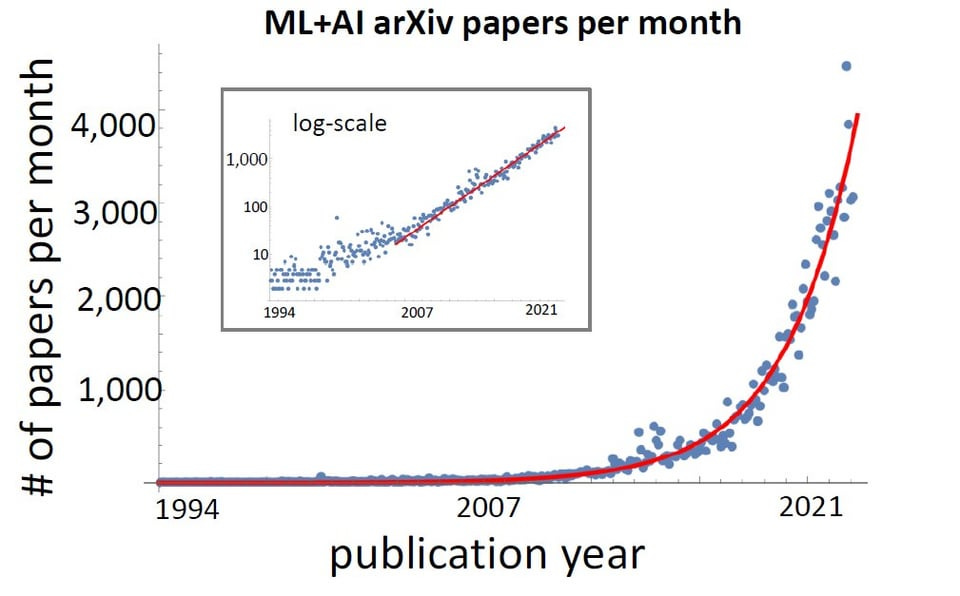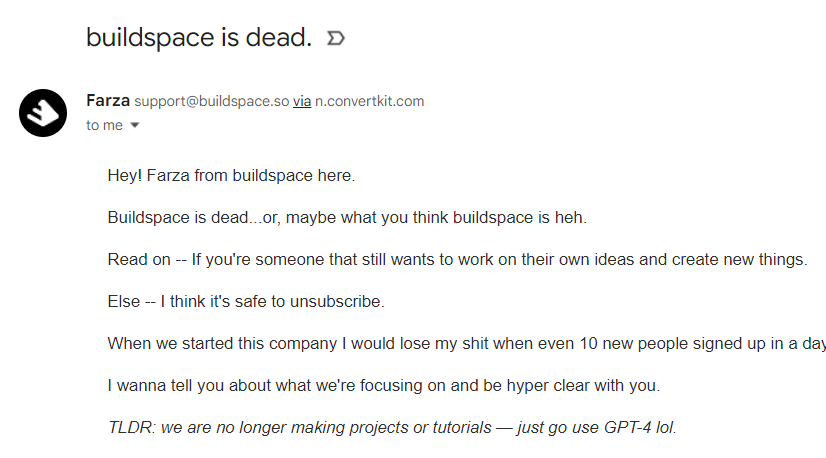What's next for the early-stage startup ecosystem?
I’ve talked to 50+ builders and investors and here's what I've learned

Just like with past crises like the Dot-com bubble, the 2008 financial crisis, or the recent pandemic, a lot of the barriers are now being dropped and even more opportunities arise. I wouldn’t go into too many details on what happened back then (just ask ChatGPT), but companies like Google, Amazon, Stripe, and many others are a direct result of these crises.
First, what are the community observations behind the current tectonic shifts in the startup land?
1. Dragged recession and “fundraising winter” created a lot of new hungry wannabe founders and then made them focus on building and bootstrapping vs raising capital right away.
With more than 2000 people being laid off in tech every day, this created a lot of smart and talented engineers, marketers, and overall wannabe founders who probably have saved a bit of money and are thinking about starting a startup.
Sam Altman, arguably one of the most influential founders and investors of our time thinks that 2023 is the best time to do so, but now it’s really hard to raise funding and so a lot of these wannabe founders and getting disappointed with the status quo and turning to bootstrapping.
2. Foundation models like LLMs (large language models — GPT-3/4, LLaMA) or diffusion models (Midjourney/Stable Diffusion/DALL-E) have gone through the AI community and taken the world by storm. But we’re still in the infancy era of seeing the aftermath, regardless of whether the research will continue to pop out something jaw-dropping every fucking week.
Business creation is already being drastically democratized: via both the speed and resources needed to execute the idea:
Engineers are using ChatGPT and Copilot to code up to 55% faster, and GPT-4 is already capable of not only generating the code using natural language as the input but also understanding errors and correcting them on the fly.
Designers are using diffusion models (and soon-to-be-released ChatGPT image input functionality) to do more and better designs.
If you don’t know how to code or design, you may actually do without anyone’s help if you know how to prompt models in the right way. And as time goes by, models improve and the UI/UX of interacting with them improves too — everyone will start using them. Just imagine an SMB owner casually creating a fully functioning website without anyone’s help.
All of this will lead to more people pursuing their ideas and starting their businesses in general (not necessarily aiming to be a startup, raise funding, and all that jazz).
But what’s most important, AI will enable founders and lean startup teams to execute 5-10x faster, maximizing their only advantage in front of incumbents.
Now, what are the main theses that will probably reshape the future ecosystem?
1. Given the ever-fastest speed of innovation, a lot of the builders struggle with finding great ideas
Most engineers have a common background and not enough deep vertical expertise so they default to building “tarpit ideas” (a term that was popularized by YC) or, simpler put, ideas that are on the surface (a good example would be “generic video summarizer powered by OpenAI API”).
With so much happening in AI, there is also a constant FOMO or fear of becoming obsolete by someone’s progress (OpenAI, we’re talking about you).
2. There has never been so much research output (the number of AI papers on arXiv per month grows exponentially with a doubling rate of 24 months) — but the problem is that all of this is very disconnected from the productization. If you’re a builder/engineer, you don’t really follow all of this research progress, you just act on some things that break the from the hype.
Here’s an illustrated timeline of the recent well-known “AI avatars” hype. For context — most of the AI avatar features have been built using the open-source Stable Diffusion model plus the Dreambooth method of fine-tuning this model.
Aug 26: Dreambooth is announced.
Sep 7: Stable Diffusion Dreambooth port is released on GitHub.
Sep 25: Corridor Crew creates a video exploring the combo (SD+Dreambooth) potential for creating personalized avatars. Crazy how they discovered it so early.
Oct 28: Pieter Levels releases Avatarai.me as one of the first viral AI avatar apps and makes some waves on Twitter. More than 2 months have passed since the announcement!
November/December: App Stores got flooded with such apps, most of them being inspired by Pieter and other indie-hackers who were the first to ride the wave. Lensa got most of the attention by carefully crafting the marketing/influencer launch.
BTW, let me give a shout-out to a great newsletter that summarizes the best Arxiv submissions each week called “David Summarizes Papers”
3. There are so many great opportunities at the intersection of ML(Machine Learning)/CV(Computer Vision) and hard domains/verticals/niches, but going after them requires having 2 things: access to experts and access to data.
Both are really hard to get if you’re an engineer or if you’re bootstrapping because that basically requires having well-developed business development skills.
Sometimes you don’t even know where to start (referring to the first thesis of how wannabe founders struggle with finding great ideas).
Usually, this is somewhat covered in the “venture/startup studio” format. Great examples would be AI Fund, Palta (where I worked), and Expa. However, startup studios usually take a VERY BIG stake in the company, sometimes making it all the way up to 50%, and that is a lot of the time a deal-breaker for founders because it leads to less motivation and a lower sense of ownership.
Okay, so what’s next? My current bet is that the “residence” format will be on the rise as the alternative to bootstrapping/accelerators/venture studios
Residencies are not new, but they do surely feel like a very appropriate format for the current conditions. They are:
Super-early stage, usually pre-idea or at least pre-committed-idea.
Don’t take the company ownership from the founder compared to venture/startup studios.
Give founders what they need the most: speed of iterations and resources (experts, guidance, community engagement).
Backers (LPs) are highly engaged and supportive of the projects because it’s not only about the money for them, it’s also about the fun and being able to participate in the earlier stages, again.
Some of the recently-launched residencies I’m following closely are:
HF0 (their website sucks so it’s better to take a look at this Twitter thread).
VC’s founder residencies like the Afore Capital’s one.
Buildspace (love their unique comms style — how many of you have ever emailed something like this?).
Entrepreneur First is one of the most (at least in Europe) well-known founder residencies. Their minus, as I feel it, is the scale.
Pioneer has always been a great inspiration however they do seem to lack the “tight-knit closed group” approach.
Ever heard of the Launch House? Very interesting premise, but poor execution. Lot’s to learn here but shows the demand once again.
If you’re also following along the YC's recent transformation under the leadership of Garry Tan, it feels a lot like they’re moving closer to the residence format too. Closer to their roots, to the earliest stages, to fewer companies in the cohort, and to the founders living in close-knit offline communities (I saw that ~85% of the batch moved to California during the batch).
Perhaps you know of more interesting examples? In that case, please let me know.
Finally, here’s a request for a residence I wish existed:
A super selective (like YC) hybrid (offline<>online) residence for builders (both hackers and hustlers with proven track records) with a focus on productizing the recent AI research breakthroughs in overlooked or hard domains.
The plan is to catch builders before they are committed to an idea and help them find a great idea at the intersection of AI and specific domains. This seems to be a very overlooked step as most of the accelerators are only accepting ideas.
Some of the money (or perhaps even most of it) will be raised through operators as LPs (current/ex-founders or executives at startups/big tech who actually want to participate in the program because it’s a great way for them to feel fun and excited once again without the need to start over).
The residence team will take up the following things on themselves:
Launching domain-specific cohorts and finding/engaging experts (either interested in advising or co-founding), partners, and data (for example, using the “give-to-get” approach)
Providing builders with the opportunity to iterate/ship quickly and not worry about anything else — via the stipend as well as the straightforward investment deal (likely uncapped SAFE with MFNs or perhaps some other founder-friendly format)
Providing builders with the opportunity to live/hang out together for some time during the program
Helping builders match together in teams
Connecting builders and residence backers in a vibrant community
Helping formed startups with biz dev and seed/series A funding
What are some of the domains that can be launched as cohorts?
Climate Tech
Healthcare
Construction
Financial Tech
Transportation
Logistics
Architecture
And many others, with a focus on the “shlep” (see more here) domains




